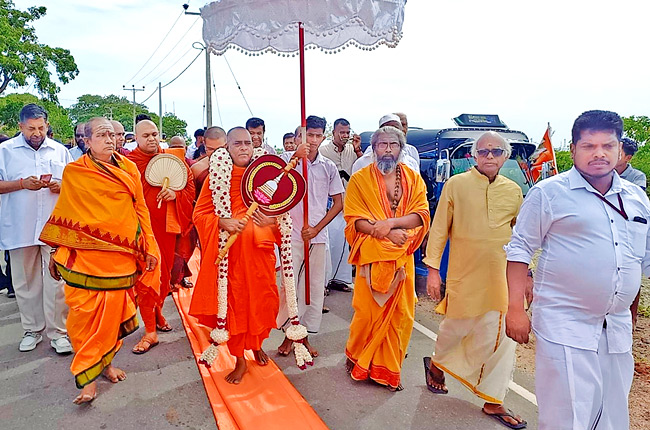Image: A ceremony was held on Wednesday (05) to felicitate the Chief Incumbent of the Nagadeepa Rajamaha Vihara Venerable Navadagala Padumakiththi Tissa Nayaka Thera to mark the completion of 50 years since his arrival to the Nainativu Island.
Issuing a statement the Global Tamil Forum (GTF) notes with pleasure the ceremony held on Wednesday (July 5, 2023) to felicitate the Chief Incumbent of the Nagadeepa Rajamaha Vihara, Venerable Navadagala Padumakiththi Tissa Nayaka Thera, to mark the completion of 50 years since his arrival in the Nainaatheevu Island.
According tot he statement the event appears to have been organised by the local Tamil community, with the participation of Buddhist, Hindu, Christian, and Islamic religious leaders, community members and leaders, and young people including school children. The venerable Thero was taken in procession with Kandyan dance and to the tunes of traditional Tamil instruments.
The statement further says that:
The many speeches, including from Hindu priests extolling the virtues of the monk and wishing him long life, and the long line of people who received blessings from the Thero – clearly showed the affection and respect with which the monk was held in the local community. The concluding speech from the venerable Thero who said, “All that I will have at the end will only be the Nainaatheevu people”, was indeed a touching finale for the special event.
Contrast this to the many protests by the local Tamil and Muslim communities when Buddhist temples suddenly appear in their midst – not to promote worship, but to impose religious superiority and oppression. A notable example is the removal of a Hindu shrine at the Kurunthur Malai Athi Ayan Temple and replacing it with a Buddha statue.
The bigger picture on such issues is centred over a few government departments dabbling in ethno-territorial politics, and the leading politicians either condoning or promoting them. A recent example is the Archelogy Department declaring vast extents of land surrounding Buddhist Temples in Mullaitivu and Trincomalee as heritage sites, and prohibiting even subsistence economic activities on these lands.
This has long become a bone of contention for the Tamil and Muslim communities and their political leaders, and can have seriously negative impact on the prospects of religious harmony and reconciliation. This issue has captured the attention of many international governments and observers to the point it was referred to in the Office of the High Commissioner for Human Rights Report (June 21) as ‘an increasing source of local conflict and tension’.
Tamil politics for the past several decades has been driven by the fear of the Tamil people losing their uniqueness and identity in the land where they have been living for centuries. It is also a fact that despite being the dominant majority, the Sinhalese community also suffers from a feeling of insecurity due to certain historical and geographical considerations.
Whether all those fears are fully justified or not, we believe it is the responsibility of all communities and their leaders to take steps to reduce the fears and insecurities of the other. It is on this matter that many politicians have not only failed, but in fact exploited peoples’ fears for their political benefits.
It is unfortunate that ethnic differences and religious harmony in Sri Lanka have been viewed almost exclusively through political prism, and the role of the civil society and religious leaders have been marginal at best. The event at Nainaatheevu clearly demonstrates the untapped potential of a complimentary approach.
